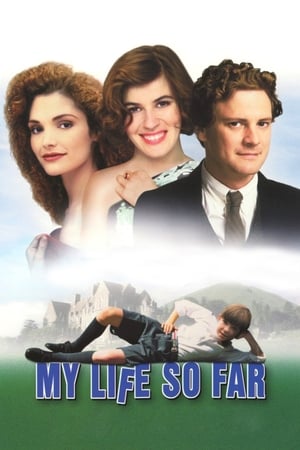
My Life So Far
**_Subtle, smart, amusing coming-of-age film in Scotland_** Fraser, who's around 10-11 years-old, lives on one of those huge British manors in 1930 with a strong matriarch, Gammy (Rosemary Harris), and a household staff. Elderly Uncle Morris (Malcolm McDowell) visits with his young French fiancé, Heloise (Irène Jacob), who incites the fascination of both Fraser and his dad, Edward (Colin Firth). Mary Elizabeth Mastrantonio plays Edward's wife. Based on a true story, "My Life So Far" (1999) is essentially a coming-of-age tale set in rural Scotland almost a dozen years after WW1 and just as the Great Depression was starting. While the story is told from the perspective of the boy, don't mistake this for a kid's movie. Sure, it starts with a fun, innocent spirit, but there's a _lot_ of adult-oriented material to appreciate. One reviewer described it as "not plot-driven," which is true, but you'll catch a grip by the second half where the various story elements came together. It immediately brings to mind the excellent "The Secret Garden" (1993) due to the fact that both take place on British country estates in the early 1900s. I suppose "The Secret Garden" is the superior film, yet "My Life So Far" won me over despite my initial apprehension. Fraser's coming-of-age parallels his father's maturing as an adult well into his 30s. Edward (Firth) is a likable inventor who runs the sphagnum moss business. He's fun, likable and preaches at his church, but he's resistant to change and refers to jazz as the devil's music. His spirituality is tested by the arrival of Heloise and is found wanting; worse, he can't hide his childish infatuation from his wife. It wasn't until _after_ watching "My Life So Far" that I realized how smart it is. It makes its points simply through showing the day-to-day life of the Pettigrew family one season in 1930. For instance, although Edward is right about the brilliance of Beethoven, he's wrong about jazz. And although his good side shines brightly, his glaring hypocrisy cannot be condoned. This isn't just testimony to the power of a beautiful woman; it's testimony to the necessity of character and faithfulness. These are just a couple examples. This is one of those films that likely gets better on repeat viewings due to the potential gems to mine and its all-around entertainment value. The film runs 1 hour, 38 minutes, and was shot in Argyll and Bute, Scotland. GRADE: B+ ***SPOILER ALERT*** (Do not read further unless you've seen the film). Did Edward have "carnal knowledge" of Heloise? No. Edward comes on to Heloise in the moss loft and she clearly rejects him, albeit respectfully. Later, during the big blow-up, he informs his brother-in-law, Morris, that he had sex with her because Morris was his rival for the estate, but it's A LIE. We know this because Heloise plainly declined his advances. So why did Edward lie? Evidently to stick-it-to his rival and cause the ensuing marriage problems. It was also his way of getting back at Heloise for rejected him. Bear in mind that on no occasion was Heloise guilty of improper conduct; she's almost godly and even rebukes Edward's hypocrisy at the dinner table, albeit subtly. Edward's lie was a very ignoble thing to do and it made me lose respect for him, but it was the result of his pent-up frustrations. Thankfully, he later humbly repents, to which his wife forgives and they go on to blissful matrimony. I hope he apologized to Morris and, especially, Heloise as well.
